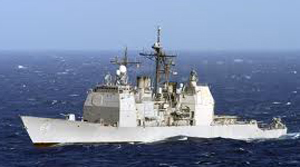Welcome to the Alternative Fuels MURI

Members of the MURI team are currently analyzing fuel and seawater samples collected from storage tanks aboard the USS Gettysburg in an effort to monitor and mitigate fuel biodeterioration and biocorrosion problems.
The Alternate Fuels Multidisciplinary University Research Initiative is a collaborative effort supported by the U.S. Navy to assess the susceptibility to microbial attack of naval fuels and future synthetic fuels and how this susceptibility leads to biocorrosion. With researchers contributing from The University of Oklahoma, Oklahoma State University, Montana State University and Colorado School of Mines, the investigative team is working to elucidate the connections between the chemical composition of various fuels and fuel blends, and their propensity to undergo biodegradation and thereby accelerate carbon steel biocorrosion. Using an array of advanced analytical technology and techniques, the interdisciplinary initiative seeks to demonstrate that fuel biodegradation problems can be monitored and interrupted at sensitive stages to prevent its spoilage and to control the process of biocorrosion.
Next Generation Fuels
The Navy has set a target of reducing military dependence on fossil fuels by 50% by 2020, which will require an increasing reliance on new fuel blends and biofuels. Newer fuel combinations have proven to be more susceptible to decay than fossil fuels, compromising performance in a number of ways, including biodeterioration of fuel quality and metal biocorrosion in facilities and vessels. Because there are no standard criteria for assessing the impact of new fuels or additives on biological processes, the MURI team is developing scientifically defensible procedures for determining the biological stability of alternate fuel formulations and their ability to impact biocorrosion.Seawater Compensated Fuel Ballast Tank models
In order to reproduce conditions in which anaerobic microbial growth and activity occurs in seawater compensated fuel ballast tanks (SWCFBT), the MURI team is using laboratory-scale carbon steel models designed and manufactured in-house for routine monitoring and experimentation. Removable carbon steel coupons located within the models can be periodically exchanged and shared among the MURI labs as dictated by experimental needs. These experiments will be conducted in conjunction with state-of-the-art procedures including a battery of molecular microbiological techniques, sophisticated analytical instrumentation, electrochemical corrosion monitoring, and robust surface imaging technologies.
Joseph Suflita, Ph.D
Center Director
University of Oklahoma
660 Parrington Oval
Norman, OK 73019
(405)325-5761
jsuflita@ou.edu